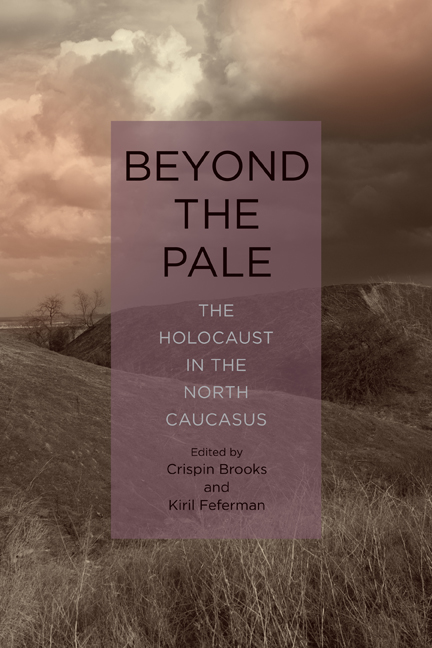Book contents
- Frontmatter
- Contents
- List of Illustrations
- Acknowledgments
- List of Abbreviations
- Note on Terminology
- Introduction
- 1 The Caucasus: A Rock in the Grinding Wheels of World History
- 2 Dwelling at the Foot of a Volcano? Jewish Perspectives on the Holocaust in the North Caucasus
- 3 “Operation Blue,” Einsatzgruppe D, and the Genocide in the Caucasus
- 4 The Kaukasier Kompanie (“Caucasian Company”): Soviet Ethnic Minorities, Collaborators, and Mass Killers
- 5 Mass Executions in Krasnodar Krai: Cross-Checking Sources for the Holocaust in the North Caucasus
- 6 In the Shadow of “Mass Treason”: The Holocaust in the Karachai Region
- 7 Rescue and Jewish-Muslim Relations in the North Caucasus
- 8 “We Were Saved Because the Occupation Lasted Only Six Months”: (Self-)Reflection on Survival Strategies during the Holocaust in the North Caucasus
- 9 The Holocaust on Soviet Territory—Forgotten Story? Individual and Official Memorialization of the Holocaust in Rostov-on-Don
- Glossary
- Bibliography
- List of Contributors
- Index
Introduction
Published online by Cambridge University Press: 06 October 2020
- Frontmatter
- Contents
- List of Illustrations
- Acknowledgments
- List of Abbreviations
- Note on Terminology
- Introduction
- 1 The Caucasus: A Rock in the Grinding Wheels of World History
- 2 Dwelling at the Foot of a Volcano? Jewish Perspectives on the Holocaust in the North Caucasus
- 3 “Operation Blue,” Einsatzgruppe D, and the Genocide in the Caucasus
- 4 The Kaukasier Kompanie (“Caucasian Company”): Soviet Ethnic Minorities, Collaborators, and Mass Killers
- 5 Mass Executions in Krasnodar Krai: Cross-Checking Sources for the Holocaust in the North Caucasus
- 6 In the Shadow of “Mass Treason”: The Holocaust in the Karachai Region
- 7 Rescue and Jewish-Muslim Relations in the North Caucasus
- 8 “We Were Saved Because the Occupation Lasted Only Six Months”: (Self-)Reflection on Survival Strategies during the Holocaust in the North Caucasus
- 9 The Holocaust on Soviet Territory—Forgotten Story? Individual and Official Memorialization of the Holocaust in Rostov-on-Don
- Glossary
- Bibliography
- List of Contributors
- Index
Summary
By definition, the North Caucasus refers to the area lying north of the Caucasus Mountains and stretching from the Black Sea in the west to the Caspian Sea in the east. Today, this region of the Russian Federation encompasses Rostov oblast, the Krasnodar and Stavropol krais, and the republics of Adygea, Karachaevo-Cherkessia, Kabardino-Balkaria, North Ossetia, Ingushetia, Chechnya, and Dagestan. This volume covers only those areas that fell under World War II Nazi German occupation, which stopped short of Chechnya and lasted, with some local variation, for around five months, from summer 1942 until early 1943. We also touch on events in occupied Kalmykia, insofar as it was part of the same wave of German advance and killing operations.
Here we address a topic—the Holocaust—that might at first glance seem foreign to the Caucasian mosaic. After all, with all the ethnic and religious heterogeneity of the Caucasian population, Jews have never figured prominently. Their destruction was carried out by a foreign power bent on realizing its ideas everywhere, irrespective of local circumstances. In fact, in terms of sheer numbers and the relatively condensed time and place, the Holocaust in the North Caucasus seems to pale in significance next to the many violent events that befell and continue to befall this region. Suffice it to remember the most prominent among them. In the eighteenth to nineteenth centuries, the long Russian-Caucasian war ended in Russian victory in 1864 and was followed by the mass expulsion of the Circassian people. The twentieth century saw the fighting between the Bolsheviks and their numerous adversaries during the Civil War, the Soviet de-Cossackization campaign of the 1920s and 1930s, famine and collectivization in the 1930s, and, after the German occupation, the deportations of several non-Russian ethnic groups (in particular, the Balkars, Chechens, Ingush, Kalmyks, and Karachais) from the region in 1943–44. More recently, the two Chechen wars began in the 1990s and continued into the early twenty-first century. In and of themselves, some of these events have been cited as examples of ethnic cleansing or genocide by both local and Western scholars, although this is not a position shared by most Russian scholarship.
- Type
- Chapter
- Information
- Beyond the PaleThe Holocaust in the North Caucasus, pp. 1 - 24Publisher: Boydell & BrewerPrint publication year: 2020

